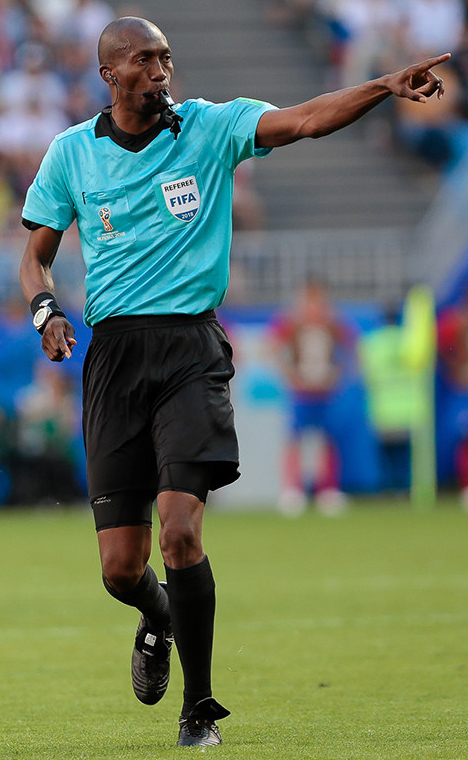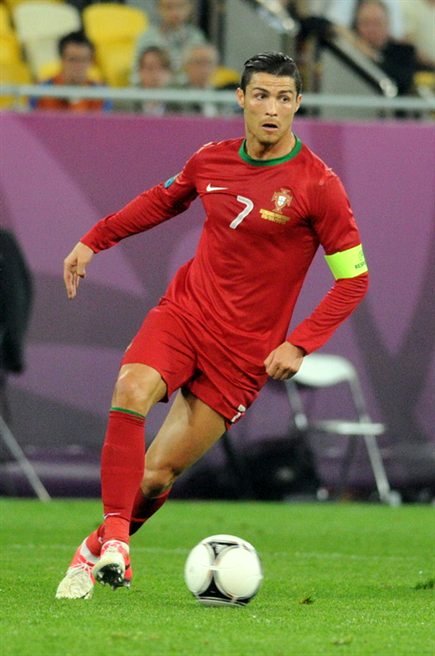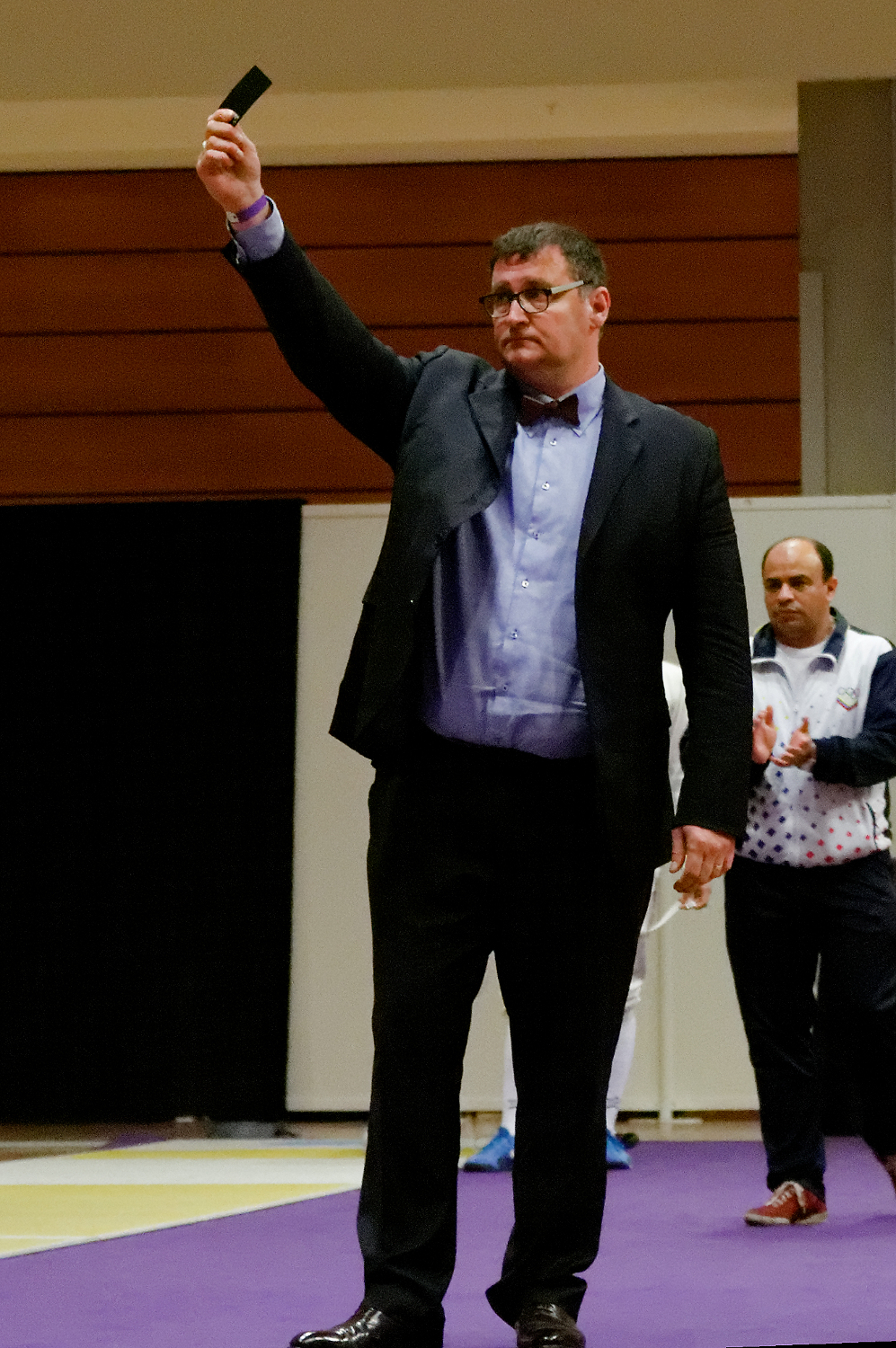|
Herbert Fandel
Herbert Fandel (born 9 March 1964 in Kyllburg, Rhineland-Palatinate) is a former German football referee who was in charge of the 2007 UEFA Champions League final. Fandel refereed the UEFA Cup final in 2006 between the English side Middlesbrough and the Spanish side Sevilla. He also refereed the 2005 FIFA Confederations Cup on home soil in Germany. He officiated the 2000 Summer Olympics in Sydney. The director of a music school by occupation, he is married with two children. He ended his field career on 8 June 2009, and has served as head of the German Football Association's Referee Commission since 2010. Notable matches 2007 Champions League Final Fandel was appointed by UEFA to referee the 2007 UEFA Champions League Final between A.C. Milan and Liverpool F.C. at the Athens Olympic Stadium. He showed four yellows, two for each side. Just before half time, AC Milan took the lead. AC Milan went on to record a 2 - 1 victory. Euro 2008 Qualifier: Denmark v. Sweden On 2 June 2007 ... [...More Info...] [...Related Items...] OR: [Wikipedia] [Google] [Baidu] |
Referee (association Football)
In association football, the referee is the person responsible for interpreting and enforcing the Laws of the Game (association football), Laws of the Game during a match. The referee is the final decision-making authority on all facts connected with play, and is the match official with the authority to start and stop play and impose disciplinary action against players and coaches during a match. At most levels of play, the referee is assisted by two assistant referee (association football), assistant referees (formerly known as linesmen), who advise the referee on whether the ball leaves the playing area and any infringements of the Laws of the Game (association football), Laws of the Game occurring outside of the view of the referee. The final decision on any decision of fact rests with the referee, who has authority to overrule an assistant referee. At higher levels of play, the referee may also be assisted by a Assistant referee (association football)#Fourth official, fou ... [...More Info...] [...Related Items...] OR: [Wikipedia] [Google] [Baidu] |
Denmark National Football Team
The Denmark national football team ( or ''herrelandsholdet'') represents Denmark and Greenland in men's international Association football, football competitions. It is controlled by the Danish Football Association (DBU), the governing body for the football clubs which are organised under DBU. Denmark's home stadium is Parken Stadium in the Østerbro district of Copenhagen. Denmark were winners of the unofficial Football at the 1906 Intercalated Games, 1906 Intercalated Games football competition and silver medalists at the Football at the 1908 Summer Olympics, 1908 and Football at the 1912 Summer Olympics, 1912 Olympics. However, as amateurs who prohibited their internationals from becoming professionals at foreign clubs, Denmark did not qualify for the FIFA World Cup until 1986 FIFA World Cup, 1986, although they won another Olympic silver in Football at the 1960 Summer Olympics, 1960. Since the 1980s and the "#Danish Dynamite (1980–1990), Danish Dynamite" team, Denmark has ... [...More Info...] [...Related Items...] OR: [Wikipedia] [Google] [Baidu] |
2007 UEFA Cup Final
The 2007 UEFA Cup Final was a football match that took place on 16 May 2007 at Hampden Park in Glasgow, Scotland. In an all-Spanish final, holders Sevilla FC, Sevilla defeated RCD Espanyol, Espanyol 3–1 on Penalty shoot-out (association football), penalties after drawing 2–2 after extra-time, becoming the first club to win the competition two years in succession since the mid-1980s (Real Madrid CF, Real Madrid won the competition in 1984–85 UEFA Cup, 1985 and 1985–86 UEFA Cup, 1986). Frédéric Kanouté was among the scorers for a second successive year. Sevilla also won the 2006–07 Copa del Rey a month later, having also claimed the 2006 UEFA Super Cup at the start of the season. Both the continental title and domestic cup would have entitled them to defend the UEFA Cup again, but their 3rd-place finish in the 2006–07 La Liga instead placed them into the 2007–08 UEFA Champions League, where their performance (reaching the group stage then winning the group) did not ... [...More Info...] [...Related Items...] OR: [Wikipedia] [Google] [Baidu] |
Graham Poll
Graham Poll (born 29 July 1963) is an English former football referee in the Premier League. With 26 years of experience, he was one of the most prominent referees in English football, often taking charge of the highest-profile games. His final domestic game in a career spanning 1,544 matches was the Championship play-off final on 28 May 2007 between Derby County and West Bromwich Albion.Graham Poll's retirement : Guardian Unlimited, 28 May 2007. Retrieved 28 May 2007. He was the English representative at two World Cups and |
Yellow Card (sports)
Penalty cards are used in many sports as a means of warning, reprimanding or penalising a player, coach or team official. Penalty cards are most commonly used by referees or umpires to indicate that a player has committed an offence. The official will hold the card above their head while looking or pointing toward the player who has committed the offence. This action makes the decision clear to all players, as well as spectators and other officials in a manner that is language-neutral. The colour or shape of the card used by the official indicates the type or seriousness of the offence and the level of punishment that is to be applied. Yellow and red cards are the most common, typically indicating, respectively, cautions and dismissals. History and origin The idea of using a universal language – neutral coloured cards to communicate a referee's intentions originated in association football, with English referee Ken Aston. Aston had been appointed to the FIFA Referees' Committ ... [...More Info...] [...Related Items...] OR: [Wikipedia] [Google] [Baidu] |
Turkey National Football Team
The Turkey national football team (), recognized as Türkiye by FIFA and UEFA, represents Turkey in men's international Association football, football matches. The team is controlled by the Turkish Football Federation (), the governing body for football in Turkey, which was founded in 1923 and has been a member of FIFA since 1923 and UEFA since 1962. The team played their first official international game in 1923 and has represented the nation in major competitions since their debut appearance at the 1924 Summer Olympics. They have participated in the Summer Olympics a total of six times (1924 Summer Olympics, 1924, 1928 Summer Olympics, 1928, 1936 Summer Olympics, 1936, 1948 Summer Olympics, 1948, 1952 Summer Olympics, 1952, and 1960 Summer Olympics, 1960), and reached the quarter-finals twice, in 1948 and 1952. The team enjoyed their highest achievements in the 2000s, most notably finishing in third place at the 2002 FIFA World Cup and the 2003 FIFA Confederations Cup, and rea ... [...More Info...] [...Related Items...] OR: [Wikipedia] [Google] [Baidu] |
Portugal National Football Team
The Portugal national football team () has represented Portugal in men's international Association football, football competitions since 1921. The national team is controlled by the Portuguese Football Federation (FPF), the governing body for football in Portugal. Portugal's home stadium is the Estádio Nacional in Oeiras, Portugal, Oeiras, located next to its primary Training ground (association football), training ground and the FPF headquarters (''Cidade do Futebol''), but the team generally plays its home matches in stadiums across the country. The head coach is Roberto Martínez, and the captain is Cristiano Ronaldo, who holds the team records for most caps and most goals. Portugal's first participation in a major tournament finals was at the 1966 FIFA World Cup, 1966 World Cup, which saw a team featuring Ballon d'Or winner Eusébio finish in third place. Portugal also made it to the semi-finals of the UEFA Euro 1984, losing to the hosts and eventual winners France nationa ... [...More Info...] [...Related Items...] OR: [Wikipedia] [Google] [Baidu] |
Euro 2008
The 2008 UEFA European Football Championship, commonly referred to as UEFA Euro 2008 or simply Euro 2008, was the 13th UEFA European Championship, a quadrennial football tournament contested by the member nations of UEFA (the Union of European Football Associations). It took place in Austria and Switzerland (both hosting the tournament for the first time) from 7 to 29 June 2008. The tournament was won by Spain, who defeated Germany 1–0 in the final. Spain were only the second nation to win all their group stage fixtures and then the European Championship itself, matching France's achievement from 1984. Spain were also the first team since Germany in 1996 to win the tournament undefeated. Greece were the defending champions going into the tournament, having won UEFA Euro 2004. They recorded the worst finish in Euro 2008, losing their three group fixtures and collecting the least prize money. Throughout 31 matches, the participating nations totalled 77 goals, the same as the pr ... [...More Info...] [...Related Items...] OR: [Wikipedia] [Google] [Baidu] |
Markus Rosenberg
Nils Markus Rosenberg (; born 27 September 1982) is a Swedish former professional Association football, footballer who played as a Forward (association football), forward. He spent the majority of his career with his boyhood club Malmö FF, as well as a notable five-year stint with German Bundesliga side Werder Bremen. Rosenberg served as Captain (association football), captain of Malmö from 2015 to 2019. Rosenberg won 33 caps for the Sweden men's national football team, Sweden national team, scoring 6 goals, and represented them at the 2006 FIFA World Cup, UEFA Euro 2008, and UEFA Euro 2012. Rosenberg began his career at hometown club Malmö FF and became the Allsvenskan List of Allsvenskan top scorers, top scorer while on loan at Halmstads BK during the 2004 Allsvenskan, 2004 season. Rosenberg's Allsvenskan success attracted interest from abroad, and ultimately he ended up playing for football clubs all across Europe, including SV Werder Bremen, Werder Bremen in the German Bun ... [...More Info...] [...Related Items...] OR: [Wikipedia] [Google] [Baidu] |
Christian Poulsen
Christian Bjørnshøj Poulsen (; born 28 February 1980) is a Danish former footballer who played as a defensive midfielder. After starting his career with Holbæk, he played for a number of European clubs, winning the Danish Superliga championship with Copenhagen, the German DFB-Ligapokal trophy with Schalke 04, and the European UEFA Cup with Spanish team Sevilla, later also playing for Italian Serie A club Juventus, as well as Premier League side Liverpool, French side Evian, and Dutch side Ajax. Since his debut in 2001, he was a regular member of the Denmark national football team and played 92 matches, scoring six goals for his country. He represented Denmark at the 2002 FIFA World Cup, 2010 FIFA World Cup and 2004 European Championship international tournaments. Poulsen was named 2001 Danish ''under-21 Player of the Year'', and won the 2005 and 2006 Danish ''Player of the Year'' awards; the first to win two consecutive seasons. Club career Early career Born in Asn� ... [...More Info...] [...Related Items...] OR: [Wikipedia] [Google] [Baidu] |
Penalty Card
Penalty cards are used in many sports as a means of warning, reprimanding or penalising a player, coach or team official. Penalty cards are most commonly used by referees or umpires to indicate that a player has committed an offence. The official will hold the card above their head while looking or pointing toward the player who has committed the offence. This action makes the decision clear to all players, as well as spectators and other officials in a manner that is language-neutral. The colour or shape of the card used by the official indicates the type or seriousness of the offence and the level of punishment that is to be applied. Yellow and red cards are the most common, typically indicating, respectively, cautions and dismissals. History and origin The idea of using a universal language – neutral coloured cards to communicate a referee's intentions originated in association football, with English referee Ken Aston. Aston had been appointed to the FIFA Referees' Commit ... [...More Info...] [...Related Items...] OR: [Wikipedia] [Google] [Baidu] |








